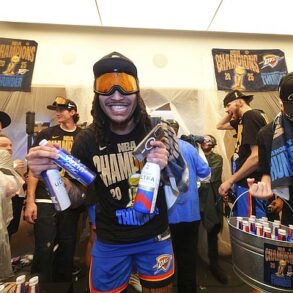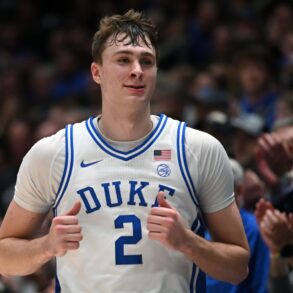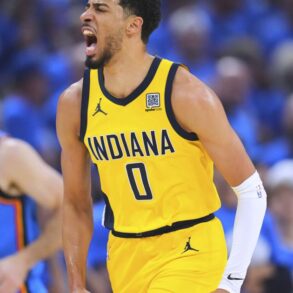“Who else has won defensive player of the year coming off the bench?” Magic Johnson’s case for Michael Cooper for the Hall of Fame was strong. It finally came true in 2024, but Johnson had been pushing for it for multiple years. The 5x NBA champ shared a strong bond with his former teammate. But was Cooper a part of the Los Angeles Lakers‘ peak showtime era?
The Showtime era of the Los Angeles Lakers wasn’t just a basketball style. It was a spectacle. If you’re a basketball fan, you’ve probably heard about it. It wasn’t just about winning games; it was about owning the moment every time the Lakers hit the floor. And yes, Michael Cooper was a part of this legendary phase of the Lakers. But before we detail his impact on the team during this time, let’s have a better understanding of this iconic phase in the NBA.
A closer look at Lakers’ showtime era
ADVERTISEMENT
Article continues below this ad
From the 1980s to the early ’90s, this era didn’t just change the game—it redefined it. So, what made Showtime so special? It was a fast-paced, run-and-gun style of basketball that left fans breathless. The team’s stars—Magic Johnson, James Worthy, and even the legendary Kareem Abdul-Jabbar—thrived under this system. Magic dazzled with his no-look passes, Worthy slashed to the rim with ease, and while Kareem wasn’t as speedy, he anchored the team with his unstoppable skyhook. Together, they turned basketball into theater.
This all started when Jerry Buss bought the Lakers in 1979. Imagine being in Los Angeles, surrounded by Hollywood glamour, and wanting your team to embody that same energy. Buss didn’t just want a good team; he wanted an experience. And boy, did he get it. Thanks to Showtime, Lakers games became the hottest ticket in town, drawing celebrities courtside and turning every game into an event.

USA Today via Reuters
Mar 7, 1980; Inglewood, CA, USA; FILE PHOTO; Los Angeles Lakers center Kareem Abdul-Jabbar (33) and guard Magic Johnson (32) look on as point guard Norm Nixon (10) shoots a free throw against the Chicago Bulls at The Forum. Mandatory Credit: David Boss-USA TODAY NETWORK
Of course, every great story has its ups and downs. Showtime began with coach Jack McKinney, but a tragic bike accident forced him to step down, and Paul Westhead took over. Westhead found some success, but his slower approach clashed with Buss’ vision. The solution? Enter Pat Riley, a coach who fully embraced the up-tempo style Buss envisioned.
With Riley at the helm, the Lakers became an offensive force of nature, winning three championships and regularly topping 50 wins a season. But even Showtime couldn’t last forever. As the stars aged, the team began to slow down—both literally and figuratively. The end came in 1991 when the Lakers lost to Michael Jordan’s Chicago Bulls in the Finals.

USA Today via Reuters
Jun 12, 1991; Los Angeles, CA, USA: FILE PHOTO; Chicago Bulls guard Michael Jordan hugs the championship trophy as he celebrates winning the 1991 NBA Finals against the Los Angeles Lakers at The Forum. The Bulls defeated the Lakers 108-101 in game5 and won the series 4-1. Mandatory Credit: MPS-USA TODAY Sports
Slowly, the iconic players retired, and the Lakers entered a rebuilding phase. It wasn’t until 2000, with Kobe Bryant and Shaquille O’Neal leading the way, that the franchise reclaimed its throne. Still, the legacy of the Showtime era is undeniable.
Magic Johnson became a 12-time All-Star and a five-time champion, Kareem added five rings to his resume, and James Worthy solidified his place in the Hall of Fame. Something that most recently Michael Cooper, too was able to do for himself.
How important was Michael Cooper during the Lakers’ showtime era?
When you think about the Showtime Lakers of the 1980s, your mind probably jumps to Johnson’s dazzling passes, Kareem’s skyhook, or Worthy’s fast-break finishes. But behind all that flair, there was Michael Cooper. The glue that held it all together with his defensive brilliance.
Cooper spent all 12 years of his NBA career with the Lakers, winning 5 championships alongside some of the greatest players and minds in basketball, including coach Pat Riley. While the spotlight often shone on others, Cooper was the team’s unsung hero, consistently locking down the league’s best scorers. The defense wasn’t just his specialty—it was his identity.
ADVERTISEMENT
Article continues below this ad

via Getty
Michael Cooper #21, Shooting Guard for the Los Angeles Lakers listens to instructions from Head Coach Pat Riley during the NBA Pacific Division basketball game against the Golden State Warriors on 15th January 1987 at The Forum arena in Inglewood, Los Angeles, California, United States. The Lakers won the game 129 – 109. (Photo by Rick Stewart/Allsport/Getty Images)
An 8x NBA All-Defensive Team member (five times on the first team) and Defensive Player of the Year in 1987, Cooper had a knack for stepping up when it mattered most. The fact Larry Bird admitted Michael Cooper was the best to defend him is further a testament to his defensive prowess. Yet, if you look at his stats—8.9 points, 3.2 rebounds, 4.3 assists, and 0.6 blocks per game—they don’t scream a game-changer. But numbers don’t tell the whole story.
Consider this: despite being a sixth man for most of his career, Cooper averaged over 27 minutes per game. That’s because his presence on the court was non-negotiable. As Magic Johnson put it, “Coop, he wasn’t really a sixth man, really… Played starters’ minutes. He was always finishing the games. He played the best of the best. They all said he was the best who guarded them.”
ADVERTISEMENT
Article continues below this ad
Think about that. A defensive maestro who broke records in the Finals (six threes in a game!) and won Defensive Player of the Year coming off the bench. It’s no wonder his value to the Showtime Lakers was described as “Hall of Fame-worthy.”
And justice was served when Michael Cooper finally took his rightful place in the Hall of Fame—34 years after playing his last game.
This post was originally published on this site be sure to check out more of their content.







